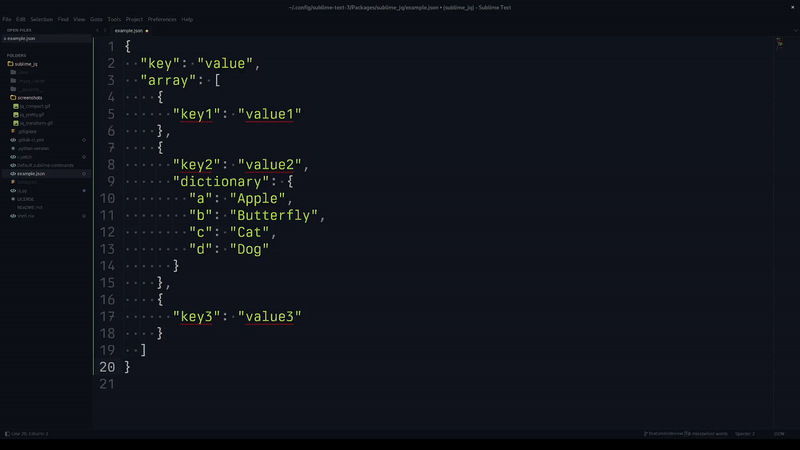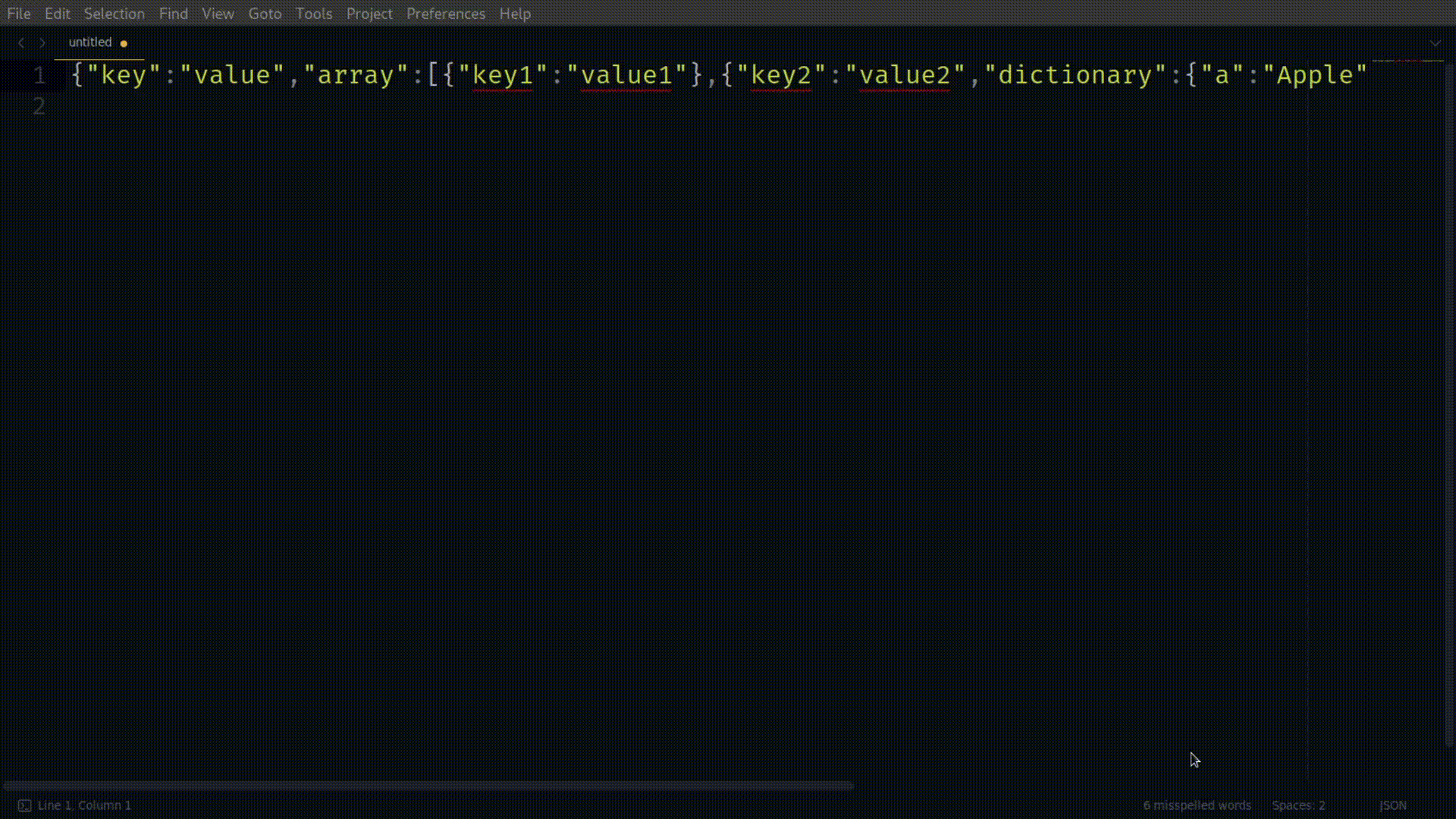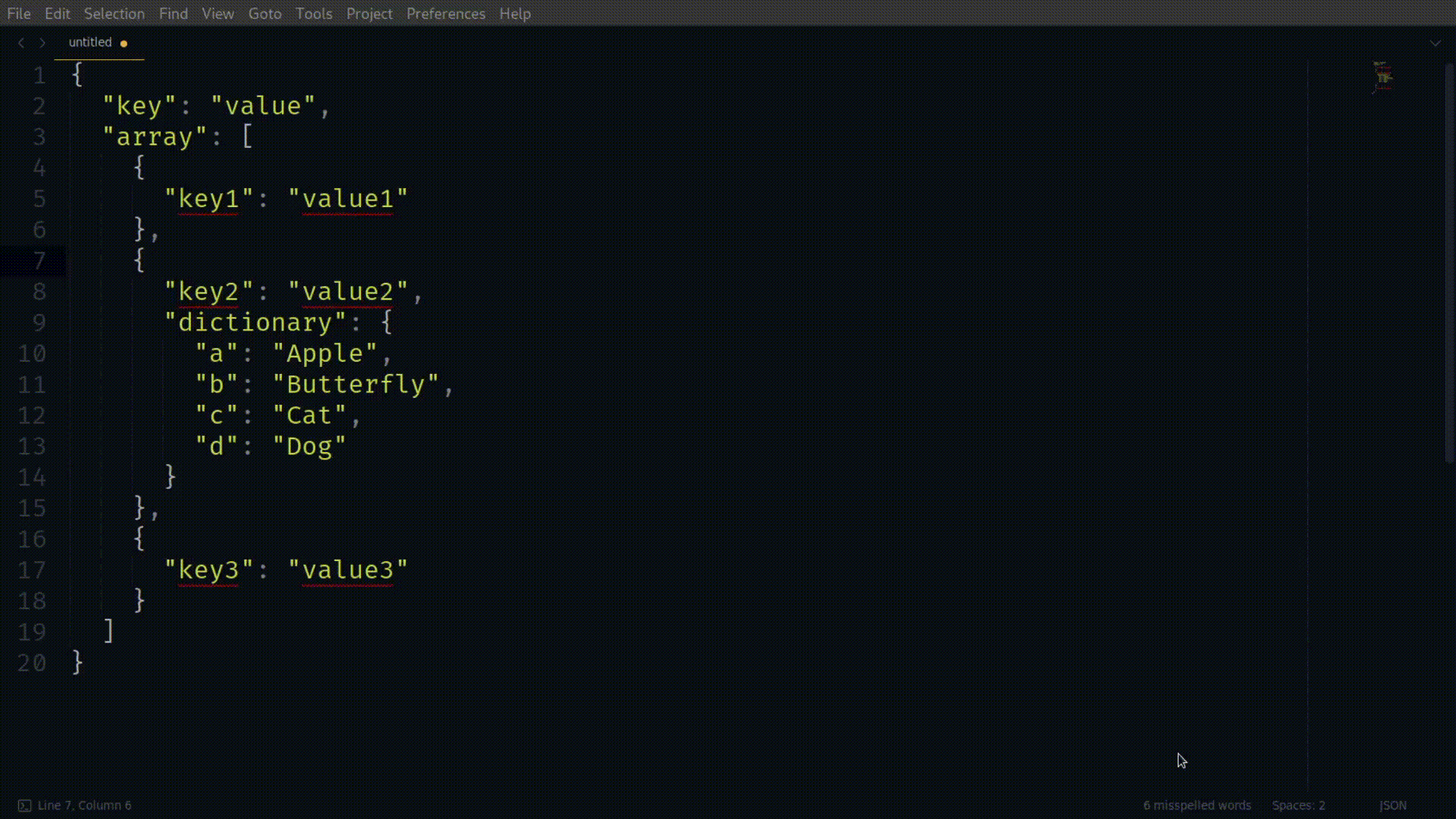Jq
Jq wrapper plugin for Sublime Text 3 & 4. It mainly lets you craft jq queries interactively, or run any jq queries via a keyboard shortcut.
Details
Installs
- Total 3K
- Win 1K
- Mac 2K
- Linux 473
| Feb 17 | Feb 16 | Feb 15 | Feb 14 | Feb 13 | Feb 12 | Feb 11 | Feb 10 | Feb 9 | Feb 8 | Feb 7 | Feb 6 | Feb 5 | Feb 4 | Feb 3 | Feb 2 | Feb 1 | Jan 31 | Jan 30 | Jan 29 | Jan 28 | Jan 27 | Jan 26 | Jan 25 | Jan 24 | Jan 23 | Jan 22 | Jan 21 | Jan 20 | Jan 19 | Jan 18 | Jan 17 | Jan 16 | Jan 15 | Jan 14 | Jan 13 | Jan 12 | Jan 11 | Jan 10 | Jan 9 | Jan 8 | Jan 7 | Jan 6 | Jan 5 | Jan 4 | |
|---|---|---|---|---|---|---|---|---|---|---|---|---|---|---|---|---|---|---|---|---|---|---|---|---|---|---|---|---|---|---|---|---|---|---|---|---|---|---|---|---|---|---|---|---|---|
| Windows | 0 | 0 | 0 | 0 | 1 | 3 | 2 | 1 | 1 | 0 | 0 | 0 | 0 | 0 | 3 | 0 | 0 | 0 | 1 | 0 | 1 | 1 | 0 | 2 | 0 | 0 | 0 | 0 | 1 | 0 | 0 | 0 | 0 | 3 | 0 | 3 | 0 | 0 | 2 | 0 | 3 | 2 | 1 | 1 | 0 |
| Mac | 0 | 2 | 0 | 1 | 1 | 1 | 1 | 3 | 1 | 1 | 0 | 0 | 1 | 0 | 4 | 4 | 1 | 0 | 0 | 0 | 1 | 1 | 1 | 1 | 0 | 2 | 1 | 2 | 0 | 1 | 0 | 0 | 1 | 3 | 1 | 1 | 2 | 0 | 0 | 3 | 0 | 0 | 3 | 1 | 1 |
| Linux | 0 | 0 | 0 | 1 | 0 | 0 | 2 | 0 | 0 | 0 | 0 | 0 | 0 | 0 | 0 | 0 | 0 | 0 | 0 | 0 | 0 | 0 | 0 | 0 | 0 | 3 | 2 | 1 | 0 | 0 | 0 | 0 | 1 | 1 | 1 | 0 | 0 | 0 | 0 | 0 | 1 | 0 | 0 | 0 | 0 |
Readme
- Source
- gitlab.com
Sublime Jq
jq wrapper for Sublime Text 3 & 4.
It gives you jq in the best of ways:
- Interactively construct a jq query with live update
- Format a JSON document (pretty print or make it compact)
- Run pre-defined jq queries on any json document with a keyboard shortcut
- Saves your jq command in history for reuse
Installation
Via Package Control
Install it from packagecontrol.io to benefit from automatic updates.
Manually
Clone this repository in your Sublime Package directory (Find it in “Preferences” and then “Browse Packages”).
Requirements
This plugin does not work on its own. It completely depends on jq.
Therefore, before using this plugin, you must have installed jq,
and you must ensure that jq is in your PATH.
That's it!
How to use it
Interactively transform JSON with a jq query
Within a given tab, start the Sublime Command Palette
with Ctrl + Shift + p, and search for jq: Transform JSON.
An input panel will be displayed at the bottom, and your JSON will be transformed on the fly while you write your jq query.
If you aren't happy with your query, you can cancel it at anytime with Escape,
and the side panel with the output will be closed.
Note:
If you finish an interactive session with Enter, your query will be saved in your history.
By default, the latest query from the history will be used next time.

Rerun a previous query from history
Within a given tab, start the Sublime Command Palette
with Ctrl + Shift + p, and search for jq: Transform JSON from history.
Select the query you prefer, and you'll be dropped in an interactive session with that query directly.
Format JSON
Within a given tab, start the Sublime Command Palette
with Ctrl + Shift + p, and search for jq: Format JSON.
Your tab content will be replaced with the formatted/pretty-printed json.

Format JSON: compact
Within a given tab, start the Sublime Command Palette
with Ctrl + Shift + p, and search for jq: Format JSON (compact).
Your tab content will be replaced with the formatted json as a 1-liner.

Commands Documentation
jq_format_json
Given a tab, pretty prints its json content. Runs jq '.' to do so.
Example:
view.run_command("jq_format_json")
Available in the command palette.
jq_format_json_compact
Given a tab, format its json content on 1 line. Runs jq --compact-output '.' to do so.
Example:
view.run_command("jq_format_json_compact")
Available in the command palette.
jq_transform_json
Given a tab, starts an interactive session to transform its json content.
Lets you run jq 'query' interactively.
If the query parameter is provided, it serves as the initial query;
otherwise, it uses the last command from the history.
Example:
view.run_command("jq_transform_json")
You can also bind it to a keyboard shortcut if you use it often:
{ "keys": ["super+j"], "command": "jq_transform_json" },
Available in the command palette.
jq_transform_json_history
Given a tab, shows a popup with the list of previous jq queries used.
When one is selected, starts an interactive session just like jq_transform_json
would, but with that previous query already filled-in.
Example: “python view.run_command("jq_transform_json_history”)
Available in the command palette.
### `jq_apply_query`
Given a tab, applies a pre-defined jq query to its content.
This is useful if you often process a json the same way, or if you want to set a shortcut to it.
Example (pretty print with sorted keys):
```python
view.run_command("jq_apply_query", {"query": ".", "sort_keys": True})
Same example, but assigns the keyboard shortcut Super + j to it:
“python
{ "keys”: [“super+j”], “command”: “jq_apply_query”, “args”: {“query”: “.”, “sort_keys”: True} },
`jq_apply_query` accepts the following arguments:
| Argument | Values | Default Value | Jq correspondence |
|------------|---------------|---------------|---------------------|
| query | string | Mandatory | jq 'query' |
| compact | True or False | False | jq --compact-output |
| slurp | True or False | False | jq --slurp |
| sort_keys | True or False | False | jq --sort-keys |
| raw_in | True or False | False | jq --raw-input |
| raw_out | True or False | False | jq --raw-output |
| null_input | True or False | False | jq --null-input |
Unavailable in the command palette, only available as a command in the console or
when assigned as a keyboard shortcut.
